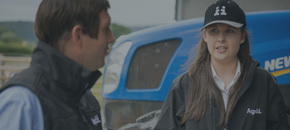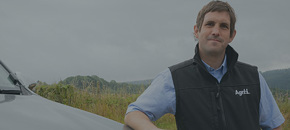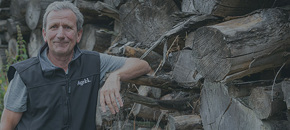Resilient Farming in Action
Live from the AgriiFocus Panel
Resilient Farming in Action: Live from the AgriiFocus Panel
Recorded live at AgriiFocus - an Agrii iFarm, at North Farm near Marlborough, Wiltshire.
Arable farming is facing an increasingly challenging environment. Improving the resilience of soils, crops and businesses is key to delivering productivity gains.
The question is: what action can you take on farm, and what technologies can you adopt?
To help you answer those questions, we have our panel:
- James Bonner, who farms in Northamptonshire
- Alan Clifton-Holt, who farms in Kent
- Ruth Mann, Head of Integrated Crop Technologies at Agrii
This Episode Features:

Tony Smith
Your Tramlines Host

Alan Clifton-Holt
Farmer, Kent

James Bonner
Farmer, Northamptonshire

Dr. Ruth Mann
Head of Integrated Crop Technologies - Agrii
Innovating On Farm: Case Studies from Growers
Alan Clifton-Holt: Diversification Through Rotation
Alan farms 3,500 acres on the Romney Marsh in Kent and has battled blackgrass for over a decade. His strategy? Widening the rotation and introducing new crops with commercial potential:
- Cover cropping to support spring cropping and suppress blackgrass
- Flax for fibre - grown and processed for linen production in France
- Mustard - tapping into new markets as French supply becomes more climate-stressed
“We're trying to pull those crops into our rotation to reduce risk, break cycles, and add resilience,” Alan explained.
James Bonner: Machinery Choices for Efficient Drilling
Farming alongside his father in Northamptonshire, James focuses on getting more out of less - particularly when it comes to machinery and soil travel.
- Upgraded from a 4m to a 6m Rapid drill to improve ground travel and reduce wheel pressure
- Modified the drill with system tines to reduce weight and improve drilling performance in wet autumns
- Split roles across older tractors for low-tech jobs and newer machines for precision applications
“Just because something worked last year doesn’t mean it’s right this year,” James added, highlighting the importance of constantly re-evaluating machinery set-ups.
Technology for Resilient Nutrient Use
Ruth Mann: Smarter Nitrogen Applications Through Sensors and Satellites
Ruth shared how Agrii’s innovation team is using real-world digital trials to help growers reduce nitrogen loss and improve input efficiency.
In one trial using Skippy Scout drone imagery and nitrate sensors, growers were able to:
- Reduce nitrogen application by 24%
- Cut CO₂ emissions by over 40%
- Maintain optimal nutrient availability in the crop root zone
Can’t Use Sensors? Satellite Imagery Offers Another Route
Even without field sensors, satellite data can show how inputs like liquid nitrogen with stabilisers impact crop density and biomass.
Agrii is now working with the European Space Agency to develop yield prediction and decision support models using historical and real-time crop data via the Contour platform.
Blackgrass Control with Grass and Maize Rotations
In the Q&A session, James explained how his two-year silage leys and spring maize crops have improved blackgrass control. The extended break from drilling autumn cereals interrupts the seed cycle and reduces pressure on following crops.
However, maize harvest timing can be a challenge - with late drilling windows increasing the risk of poor establishment in the autumn.
Market Access and Supply Chain Resilience
Alan discussed his access to the French flax market, where demand is increasing for both textiles and natural fibre-based composites in automotive manufacturing.
“It’s outside food and a growth sector. The whole supply chain works differently—processing can take up to two years, which levels supply into the textile industry,” he explained.
Top Tips from the Panel
James Bonner’s Tip:
“Don’t wait for problems—anticipate stress events like drought or heat and prepare with the right foliar nutrition and biostimulants. Small machinery changes can make a big difference.”
Ruth Mann’s Advice:
“Start collecting data on your nitrogen use. Even small adjustments informed by technology can reduce losses and emissions significantly.”
Alan Clifton-Holt’s Insight:
“Think beyond food crops. Look at industrial and fibre markets to diversify rotations and reduce exposure to traditional commodity risks.”
Have a question for one of our experts? Email us at info@agrii.co.uk.
Subscribe to Tramlines on your favourite podcast platform and join us next time as we meet more growers, experts and researchers helping shape the future of UK agriculture.
Related episodes
Get Your Crops Right This Spring – Nutrition, Tech and Protection Tips
Episode 17Maize Under Pressure – Building Resilience into the System
Episode 16Can carbon actually make you money?
Episode 15Building Crop Resilience to Protect Yield
BASIS & NRoSO points available Episode 13Smarter Margins
Episode 12A Plain English Policy Update with AIC, AHDB and Agrii
BASIS & NRoSO points available Episode 6The Reality of SFI: Part 2 - The What, Where and How?
Episode 19Scottish Farming in Focus: Seasonal Advice from Bee Edge Farm
Episode 17Smart Nutrition: Maximising ROI on Phosphate, Potash & Nitrogen
Episode 18







